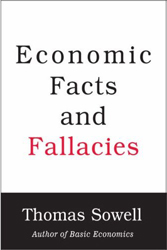|
What his book lacks in sex appeal (and with a plain
black and white cover and unimaginative chapter titles,
it is a lot less glitzy than the other two books
mentioned above) it more than makes up for in pertinent
information. I really do not want to knock those other
successful, enjoyable, and informative books—the more
people learn about economics, the better—but whereas
Levitt and Dubner devote significant pages to minutia
like baby names, sumo wrestlers, and game show
contestants, and Harford delves into the intricacies of
coffee prices and auctions, Sowell gives us six lean,
meaty chapters on cities, gender, academia, income,
race, and the Third World. Freakonomics and
The Undercover Economist may be better starter
books, designed to entice the truly uninitiated to begin
thinking about economics, and they do address some
weightier issues along with the lighter fare. But
Economic Facts and Fallacies takes on some of the
most fundamental issues of our time and tackles them
head on. In the process, Sowell not only provides a
clear and convincing case for the importance of economic
thinking; drawing on history and logic, he also makes a
powerful case for the superiority of free markets.
"Some things are believed because they are demonstrably
true," Sowell tells us at the outset of his book. Other
things, however, are believed simply because they fit
with certain preconceptions. Economic policies based on
fallacies instead of facts can have devastating impacts
on the lives of millions of people, especially the most
vulnerable. Seeing through those fallacies is of crucial
importance for anyone who wants to move beyond good
intentions and actually help their fellow human beings.
|
In his introductory chapter, Sowell sketches out
four common, general fallacies that crop up
again and again in a variety of contexts. First
is the zero-sum fallacy, in which one
person's gain is thought to entail another
person's loss. This is belied by the hundreds of
millions, if not billions, of voluntary
exchanges that take place on this planet every
day, with each party to each exchange benefiting.
Why else would they voluntarily participate?
Second is the fallacy of composition, in
which what is true of a part is thought to be
true of the whole. If subsidizing one person
helps that person, then subsidizing everyone
will help everyone, right? Third is the chess-pieces
fallacy, in which social planners imagine
they can arrange human beings like pawns on a
game board. Human beings, of course, have their
own designs, which can conflict with the plans
of social experimenters—and the uncertainty
caused by constant social experimentation can
lead to many unintended consequences. Fourth is
the open-ended fallacy, where desirable
things are advocated without regard for the fact
that, at any given time, resources are limited,
and that there are always tradeoffs to be made
between desirable alternatives. Safety is great,
for instance, but safety at all costs would make
air travel (and car travel, for that matter)
grind to a halt. |
|

Economic Facts and Fallacies
by Thomas Sowell
Basic Books (2008) |
The chapters that follow provide many examples of these
and other fallacies, testing them against the hard
evidence of history and economics. Many of the common
but erroneous assumptions discussed are not only
examples of group think, but are related to how we think
about certain groups of people, whether delineated by
gender, class, or race. Just as a sample of the many
counter-intuitive findings contained in the three
chapters devoted to these groups, we learn, for
instance, that even before affirmative action kicked in,
single women in the United States "who had worked
continuously since high school were in 1971 earning
slightly more than men of the same description."
It is largely the choices women tend to make—to work
less or to interrupt their work in order to support
their husbands' careers, and to bear and rear children—that
account for the lower pay they receive on average.
With regards to the
persistence of class differences, Sowell points out how
misleading it is, for instance, to point to the fact
that household incomes are stagnating when the
number of people per household is falling—a fact which
is itself a mark of rising living standards. Also
very important when thinking about the "haves" and the
"have nots" of the developed world (which Sowell quips
would today more accurately be labelled the "haves" and
the "have lots") is the great social mobility that
exists even in an imperfectly capitalist society. In a
study that followed tens of thousands of individuals for
many years, Sowell tells us, "Among individuals who are
actively in the labor force, only 5 percent of those who
were in the bottom 20 percent in income in 1975 were
still there in 1991." This is all the more significant
when compared with the 29 percent of those in the bottom
20 percent in 1975 who had risen to the top 20
percent by 1991.
|


